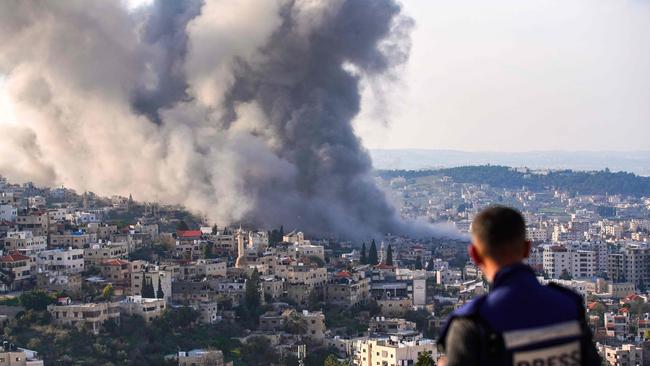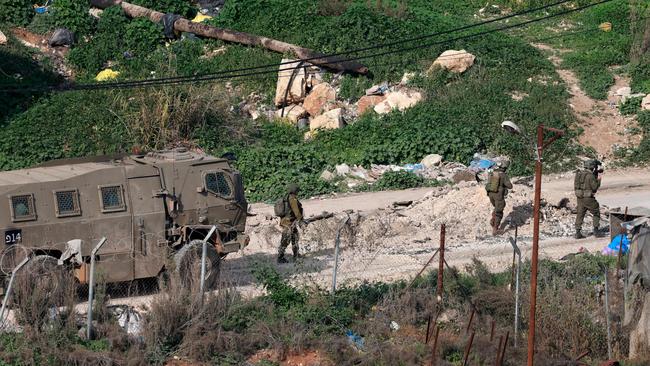Demolitions in Jenin signal Israel’s new approach in the West Bank
The Israeli government has expanded its official aims in the Gaza war to include the West Bank, vowing to eradicate militant groups, starting with those in Jenin.
The West Bank is the new battleground in Israel’s post-Oct. 7 war. Jenin refugee camp is the front line.
On Sunday, Israeli forces razed 23 buildings in Jenin, cutting a swath through the camp with simultaneous explosions that were heard across much of the northern West Bank. The large-scale demolitions resembled a tactic used in Gaza, where the Israeli military created corridors to divide the enclave.
In Jenin, they appear to signal a more aggressive approach by Israel that could reshape the West Bank physically and politically, Israeli analysts and Palestinians said. If Israel tries to suppress militant groups in the West Bank with the use of large-scale force, many West Bank residents fear, the results could echo those in Gaza: The destruction of dense urban areas, the displacement of many civilians and mounting political anarchy.
“Israel is bringing the war to the West Bank,” said Palestinian politician Mustafa Barghouti, noting that Israeli forces are already expanding their operations to other parts of the territory.
Israel’s military said the demolitions on Sunday were aimed at destroying houses associated with “terrorist infrastructure.” The government last month expanded its official aims in the Gaza war to include the West Bank, vowing to eradicate militant groups, starting with those in Jenin.

“The Jenin refugee camp will not return to what it was,” Israeli Defense Minister Israel Katz said last week as he visited the camp with army commanders. After the current offensive, which began with airstrikes and a ground-forces manoeuvre in the Jenin camp two weeks ago, Israeli forces “will remain in the camp to ensure that terror does not return,” he said.
Katz didn’t say how long Israeli troops would stay, or who would govern and provide basic services to the population under a prolonged occupation of the area. The fighting has caused widespread damage to the camp’s dense housing and many families have fled, but others remain, according to local residents.
Israeli forces appear to be cutting the Jenin camp into segments, according to local residents and Israeli analysts: widening roads with bulldozers and demolishing buildings to facilitate the movement of troops through the labyrinth of cement and cinder blocks.
The method resembles Israeli forces’ approach in Gaza, albeit on a smaller scale, said Michael Milshtein, a former head of the Palestinian division at Israeli military intelligence. “They are attempting to divide the camp into several parts. It’s very similar to northern Gaza,” he said.

But as in Gaza, it is far from clear whether Israel has a plan for pacifying the area after the fighting, said Milshtein, now a scholar of Palestinian affairs at Tel Aviv University. “Similar to Gaza, we see tactical or operational moves, but what is the strategy?”
The fighting in Jenin has further weakened the already enfeebled Palestinian Authority, which governs parts of the West Bank under agreements with Israel signed in the 1990s. The Palestinian Authority and the secular nationalist Fatah party that control it have lost much of their popular support due to corruption, repression and failure to achieve national self-determination.
This winter, the Palestinian Authority’s security forces tried for weeks to uproot militants in Jenin camp, but achieved little. Israeli forces took over, wielding far greater firepower. The PA’s effort was deeply unpopular with Palestinians, many of whom now see the body as little more than a subcontractor for Israel’s occupation.
Jenin camp, a maze of cement and cinder blocks that sprawls across a hillside above the city of the same name, was built after the Arab-Israeli war of 1948 that led to the foundation of Israel and the forced displacement of many Palestinians. The camp has long been one of the centres of militant resistance to Israel’s occupation of the West Bank since 1967. In the past few years, militants from various factions based in the refugee camps of Jenin and other West Bank cities have launched more attacks on Israeli soldiers and settlers.
The increasingly frequent attacks forced Israel to deploy much of its army in the West Bank. That partly explains why Israel failed to defend its border with Gaza when Hamas attacked on Oct. 7, 2023, said Eado Hecht, a defence specialist at Bar-Ilan University. The recent ceasefires in Lebanon and Gaza have allowed Israeli forces to once again focus on the militant threat in the West Bank, he said.
Some Palestinian officials say the timing of Israel’s assault in Jenin is all about politics. The Gaza ceasefire deal, which has allowed Hamas to resurface in the Gaza Strip, has left many supporters of Israel’s right-wing government angry and frustrated. Prime Minister Benjamin Netanyahu and his far-right coalition ally, Finance Minister Bezalel Smotrich, have presented the escalating crackdown in the West Bank as a continuation of the war.
Brig. Gen. Anwar Rajab, the spokesman for the Palestinian Authority’s security forces, said Israel’s operation in Jenin was part of a wider effort to undermine it. He said Israel’s military had interrupted the Palestinian security forces’ operation in Jenin and accused Israel of not co-ordinating its manoeuvre with them.
Israel’s political leadership has long accused the Palestinian Authority of supporting and inciting terrorism. Israeli security agencies, however, view it as an important partner in containing militant groups.
In Jenin camp and other parts of the West Bank, a new generation of Palestinians has turned to militant factions because of the failings of the Palestinian Authority, violence by Israeli settlers and the lack of prospects for a better life, said Nimrod Novik, a former Israeli government adviser. “Young Palestinians, especially those too young to remember the scars of the second Intifada, look for a violent alternative,” said Novik, now a fellow at the Israel Policy Forum, a U.S.-based think tank.
Novik said the destruction in Jenin might well become a model for Israeli operations in the region. “What we’re watching in Jenin is a slow slide into the Gazafication of the West Bank.”
Dow Jones



To join the conversation, please log in. Don't have an account? Register
Join the conversation, you are commenting as Logout